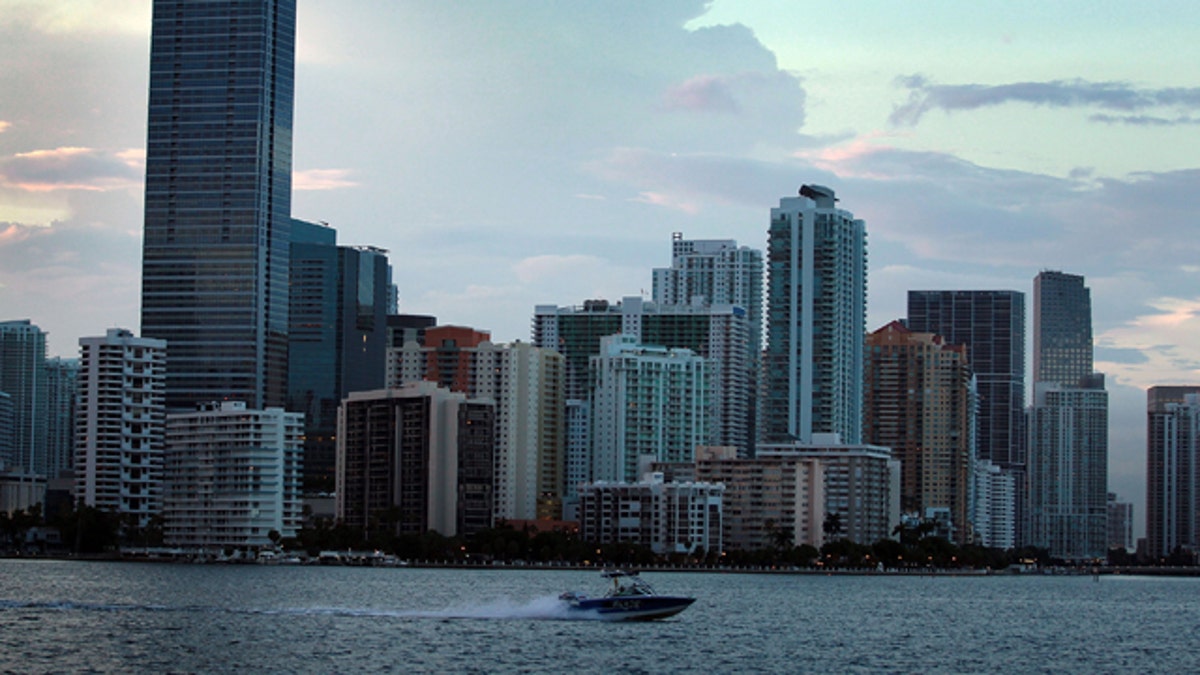
MIAMI - AUGUST 06: The City of Miami skyline is seen on August 6, 2010 in Miami, Florida. As thousands of newly built condominium units start to fill up with new owners and tenants downtown Miami is starting to see business and activity pick up in the area. (Photo by Joe Raedle/Getty Images) (2010 Getty Images)
A yacht may turn out to be the proverbial "smoking gun" in the courtroom showdown between the United States and former CIA operative Luis Posada Carriles.
Posada Carriles, 82, is accused of lying under oath about how he reached U.S. soil and for failing to acknowledge planning a series of hotel bombings in Havana in 1997 that killed an Italian tourist. He is charged with perjury, obstruction and immigration fraud.
Well-known in his native Cuba as a personal nemesis of Fidel Castro, Posada Carriles, had told immigration officials he sneaked across the Texas border with a people smuggler. But prosecution witness Gilberto Abascal places Posada Carriles aboard a yacht that he says picked up the Cuban militant in Mexico and helped him slip ashore in Miami in 2005
Posada Carriles's lead attorney, Arturo Hernández, clashed with Abascal, calling him a "scoundrel" and making his fourth request for a mistrial since Abascal took the stand last week. U.S. District Judge Kathleen Cardone denied it, as she has the others.
Abascal, a suburban Miami handyman and FBI informant, says he was the mechanic on the yacht. The other passengers have refused to testify against Posada Carriles and some have even been jailed for it. Abascal was finally excused and Wednesday's testimony should focus on the arrival of the yacht, called the Santrina, in Miami waters on March 18, 2005.
Cletus William, a U.S. Customs and Border Protection officer assigned to register boats entering the country in Miami, testified Tuesday that the Santrina made him suspicious since it seemed too large a vessel to simply be returning from a cruise to the Bahamas, as those onboard claimed.
He said Posada Carriles was not on the boat by the time it registered with border authorities. That was consistent with Abascal's account that Posada Carriles left the Santrina aboard a speedboat that dropped him ashore at a waterfront restaurant.
Before Abascal stepped down, Hernández asked about an interview he gave to The Miami Herald in 2006, in which Abascal said he was going to cooperative with the FBI because, "I am not going to serve 20 years for anybody."
Hernández suggested Abascal had been pressured into testifying. Abascal responded by accusing Hernández of slandering him in the press.
When jurors took a break, Hernández told the judge that the testimony amounted to a personal attack and accused prosecutors of not doing enough to fix the problem.
"Because I've shown the light on that scoundrel, he has attacked me," Hernández said. "I need to retain my credibility in front of this jury. . . . I am asking that the court correct it in the only way it can."
U.S. Attorney Jerome Teresinski said Hernández was trying to intimidate Abascal, prompting the defense attorney to accuse the prosecutor of being "loose with his facts and loose with his mouth."
Tension between Hernández and Abascal had been building for days. Abascal previously accused Hernández of having him followed in Miami and sending agents to his ex-wife's home, and he even cried outside the courtroom, saying he was overcome with hatred for the defense attorney. Those past accusations — or prosecutors' arguments in support of their witness — prompted Hernández's first three calls for a mistrial.
The man at the center of the case has struggled at times to stay awake — an image that clashes with Posada Carriles's lifetime spent as an anti-communist militant.
After participating indirectly in the Bay of Pigs invasion, Posada Carriles worked for the CIA and later served as head of Venezuelan intelligence. In the 1980s, he helped support U.S.-backed Nicaraguan "contra" rebels.
Posada Carriles was imprisoned in Panama for a 2000 plot to kill Castro during a visit there, but was eventually pardoned and arrived in the U.S., prompting the current charges against him. He was jailed in El Paso but released in 2007 and has been living in Miami.
Posada Carriles admitted in a 1998 interview with the New York Times to organizing the 1997 hotel attacks in an effort to hurt Cuban tourism, but he has since recanted. Cuba and Venezuela also accuse him of organizing an explosion aboard a Cuban airliner in 1976 that killed 73 people.
A U.S. immigration judge has previously ruled that he couldn't be deported to either country because of fears of torture.
Based on reporting by the Associated Press.
Follow us on twitter.com/foxnewslatino
Like us at facebook.com/foxnewslatino








































